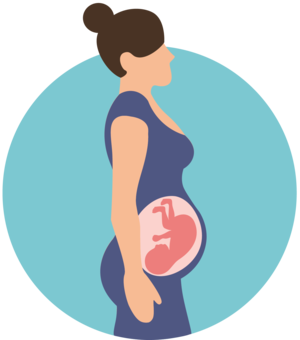Pregnancy at week 38
4-minute read
Your baby
Your baby is now ready to be born. They weigh about 3.2kg and measure about 35cm from head to bottom. They may still have some lanugo – fine hair – on their body, but it has mostly disappeared. They are probably covered in vernix, a white, creamy film that protects their skin from amniotic fluid.
The meconium inside your baby’s bowel can sometimes be released during labour. If this happens, it would turn the amniotic fluid green. Your baby would then need to be monitored closely since it could be a sign they are in distress.
Your baby at 38 weeks
| Length: | 35cm (head to bottom) |
| Weight: | 3.2kg |

Your body
You could go into labour at any time between now and 42 weeks. You might notice the very early signs of labour, which include pressure in your pelvis, cramps or tightening like period pains, backache or diarrhoea. You might have a ‘show’ – when a plug of mucus comes out of your vagina – or your waters might break, either as a trickle or a gush.
You will know if you are in labour when you have strong, regular contractions that last for at least a minute each.
You are probably feeling tired and uncomfortable, but some women get a burst of energy in the last few weeks of pregnancy. You may feel like you need to prepare the house for the baby. Just be careful not to exert yourself physically.
Things to remember
Every labour is different. Often, labour is very slow and can take hours or days. But sometimes, things can move very quickly.
It’s a good idea to have a plan in place for what to do when labour starts. Your doctor or midwife will have discussed with you when to go to the hospital. It’s a good idea to give the hospital a call when you go into labour.
Make sure you know how you will get to hospital when the time comes. Do not drive yourself. If for some reason you can’t contact your partner or support person, make sure you have another way of getting there.
Read next

Your pregnancy at 39 weeks
Learn about your pregnancy journey and what is happening to you and your baby.

Speak to a maternal child health nurse
Call Pregnancy, Birth and Baby to speak to a maternal child health nurse on 1800 882 436 or video call. Available 7am to midnight (AET), 7 days a week.
Learn more here about the development and quality assurance of healthdirect content.
Last reviewed: August 2020



